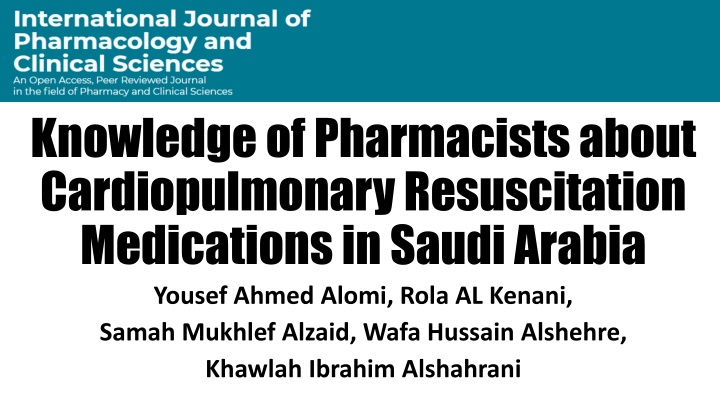
Knowledge of Pharmacists about CPR Medications in Saudi Arabia Study
This study examined the knowledge of pharmacists in Saudi Arabia regarding cardiopulmonary resuscitation (CPR) medications. Findings showed that pharmacists had inadequate knowledge, highlighting the need for improved education and training in CPR medication management.
Download Presentation

Please find below an Image/Link to download the presentation.
The content on the website is provided AS IS for your information and personal use only. It may not be sold, licensed, or shared on other websites without obtaining consent from the author. If you encounter any issues during the download, it is possible that the publisher has removed the file from their server.
You are allowed to download the files provided on this website for personal or commercial use, subject to the condition that they are used lawfully. All files are the property of their respective owners.
The content on the website is provided AS IS for your information and personal use only. It may not be sold, licensed, or shared on other websites without obtaining consent from the author.
E N D
Presentation Transcript
Knowledge of Pharmacists about Cardiopulmonary Resuscitation Medications in Saudi Arabia Yousef Ahmed Alomi, Rola AL Kenani, Samah Mukhlef Alzaid, Wafa Hussain Alshehre, Khawlah Ibrahim Alshahrani
ABSTRACT ABSTRACT: : Objectives Objectives: : To illustrate the knowledge of pharmacists about CPR medications services in Saudi Arabia. Materials Materials and and Methods sectional survey that discussed pharmacist s knowledge of Cardiopulmonary Resuscitation (CPR) medications in Saudi Arabia. The survey consisted of respondents demographic information about pharmacists and Cardiopulmonary Resuscitation (CPR) drugs, assessment of primary and advanced knowledge, and the resources used for Cardiopulmonary Resuscitation (CPR) medications. The 5- point Likert response scale system was used with closed-ended questions. The survey was validated through the revision of expert reviewers and pilot testing. Besides, various tests of the reliability of McDonald s , Cronbach alpha, Gutmann s 2, and Gutmann s 6 were carried out with the study. The data analysis of the Pharmacist practice of Cardiopulmonary Resuscitation (CPR) medications is done through the survey monkey system. Besides, the statistical package of social sciences (SPSS), Jeffery s Amazing Statistics Program (JASP), and Microsoft Excel sheet version 16 were implemented. Methods: : The study analyzed a cross-
ABSTRACT: ABSTRACT: Results Results: : A total number of 439 pharmacists responded to the questionnaire. Of them, more than onethird responded from the Central region (122 (31.69%)), one Quarter responded from the Eastern region (91 (23.64%)), and one-fifth responded from the southern part (79 (20.52%)). Males responded more than females (203 (53.14%)) versus 179 (46.86%)), with statistically non- significant differences between all levels (p=0.219). Most of the responders were in the age group of 36-45 years (152 (39.48%)) and 46-55 years (134 (34.81%)), with statistically significant differences between all age groups (p=0.000). The majority of pharmacists had training courses in Basic Life Support (BLS) (293 ((77.11%)), Advance Cardiac Life Support (ACLS) (289 ((76.05%)), Pediatric Cardiac Life Support (PCLS) (287((75.53%)), and Neonatal Cardiac Life Support (NCLS) (203 ((53.42%)), with statistically significant differences between all levels (p=0.000). The average score of basic knowledge of pharmacists about Cardiopulmonary Resuscitation (CPR) medications was (1.67). The element know how to prepare and dispense ACLS medications list obtained the highest score (2.04). The aspect there is an official standardized NCLS medications list (1.94), and The element there is an official standardized PCLS medications list (1.93). The average score of advanced knowledge of pharmacists about Cardiopulmonary Resuscitation (CPR) medications was (1.86). The element know the compatibility of ACLS medications obtained the highest score (2.31). The aspect know the drug - interactions with NCLS medications (2.27), and The element know the drug - interactions with PCLS medications (2.17). The resources used most about the CPR medications were Medical association literature/guidelines/recommendations 307 (76.56%), Peer discussions 298 (74.31%), and Scientific literature 293 (73.07%).
ABSTRACT ABSTRACT: : Conclusion Conclusion: : The pharmacists knowledge of CPR medication was inappropriate. Therefore, undergraduate education and training of CPR medication is high recommended. Besides, involvement training for postgraduate studies is required to improve pharmacy staff knowledge of CPR services and patient outcomes in Saudi Arabia.
Key Words : Key Words : Knowledge, Pharmacists, Cardiopulmonary Resuscitation, Medications.
CONCLUSION: CONCLUSION: The knowledge of the pharmacist about CPR medication was insufficient. Most pharmacists are familiar with preparing and dispensing CPR medications and an official list of medicines in CPR services. Besides, drug comparability and drug interactions of CPR medications. In contrast, most responders were unfamiliar with the doses and method of administration of CPR medications. In addition to inadequate knowledge of adverse drug reactions and the cost of medications. The majority of pharmacists used medical association therapeutics guidelines and peer discussions. Various factors might affect pharmacist knowledge about CPR medication, such qualifications, and the existence of CPR teams at healthcare facilities. Therefore, targeting undergraduate and postgraduate advanced life support education emphasizes CPR medication is highly recommended in Saudi pharmacy practice. CPR as work sites, age, academic
